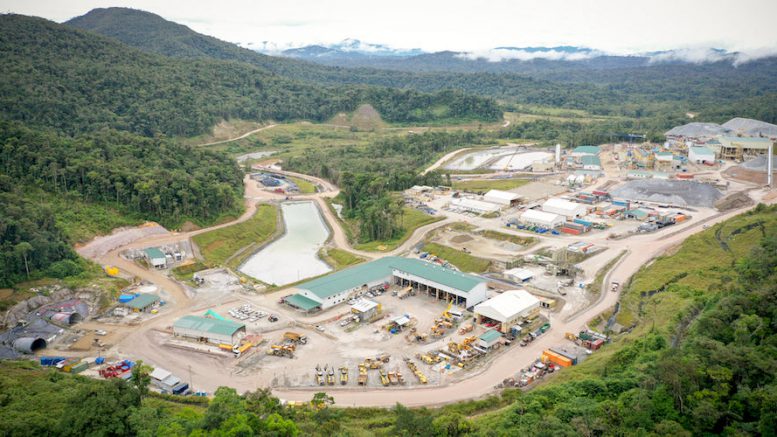Lundin Gold’s (TSX: LUG) largest drill program since 2007 in the Fruta del Norte (FDN) district in southeast Ecuador has confirmed the continuity and expansion potential of recent discoveries Bonza Sur and FDNS.
Lundin’s near-mine program focuses on the two targets south of the FDN mine to expand the mineralization. At the same time, the conversion program is concentrating on extending FDN’s known mineral resources, mainly along its southern bounds, the company reported after market close Thursday.
The program produced a highlight intercept in hole FDN-C23-025, which returned 223 grams gold per tonne over 16.4 metres from 10.2 metres depth, including an exceptionally high-grade section of 77.2 grams gold over 1.9 metres. The near-mine program produced a highlight intercept in drill hole FDNS-2023-024, which returned 11.6 grams gold over 7.1 metres from 412.4 metres depth, including 76.5 grams over 1 metre.
The conversion program’s success in identifying higher-grade zones within the inferred resource at FDN’s southern extension is particularly noteworthy. This achievement has increased confidence in the geological model and offers the potential to convert more resources into reserves.
Lundin aims to complete about 43,000 meters of drilling this year using nine rigs across its near-mine, regional, and conversion initiatives. It has completed about 12,400 metres of drilling out of the planned 23,000 metres of the near-mine program, which was upsized following the FDNS and Bonza Sur discoveries.
In a note to clients, Canaccord Genuity mining analyst Jeremy Hoy highlights Lundin’s track record in near-mine exploration, which led to positive updates in the company’s reserve and resource estimates as of Dec. 31 last year. FDN hosts measured and indicated resources of 23 million tonnes grading 9.2 grams gold per tonne for 6.8 million oz. of metal, with another 9.2 million tonnes grading 5.6 grams gold for 1.7 million oz. in the inferred category.
Proven and probable reserves total 18 million tonnes grading 8.7 grams gold per tonne for 5 million oz. gold.
Hoy’s analysis suggests that the ongoing near-mine exploration “could open doors for further growth.” The Bonza Sur mineralized zone has demonstrated potential for expansion. Recent drilling has extended the known mineralization along strike and down dip, indicating the possibility of even more significant reserves.
The FDNS drilling has identified a series of parallel mineralized veins with characteristics similar to those found in the FDN deposit. Importantly, these veins appear to have expansion potential, particularly to the southwest and at greater depths.
“The expansion of the Bonza Sur mineralized zone and the delineation of the FDNS veins attest to the company’s strategic focus on tapping into previously untapped mineral wealth,” he wrote. “As drilling rigs continue to unearth valuable insights, Lundin’s story is evolving into one of remarkable promise and potential.”
In addition to focusing on known areas, the company is also testing new targets located north and east of FDN. This strategy aims to uncover untapped mineralization and growth opportunities beyond the current mining zones.
Lundin’s regional exploration program is also making strides. The company is exploring targets further south within the Suarez Basin, a potentially promising area with untapped potential.
Hoy maintains a positive outlook on Lundin Gold, assigning a ‘buy’ rating and a target price of $21.00.
At $17.05, the company has come off its recent highs but is still trading at more than double compared with a year ago. It has a market capitalization of $4 billion.


Be the first to comment on "Lundin’s Fruta del Norte drilling could ‘open doors’ to resource growth"